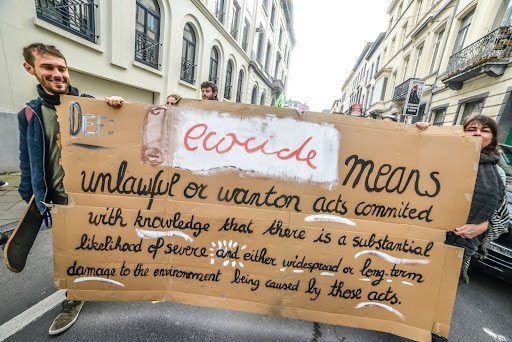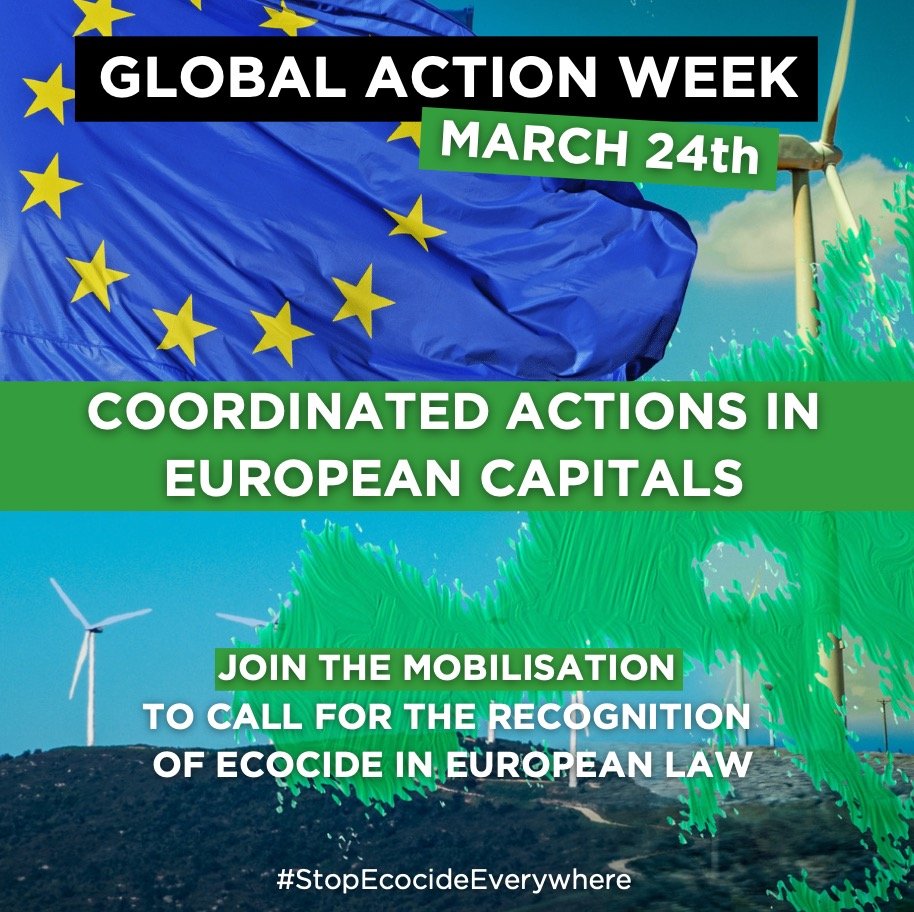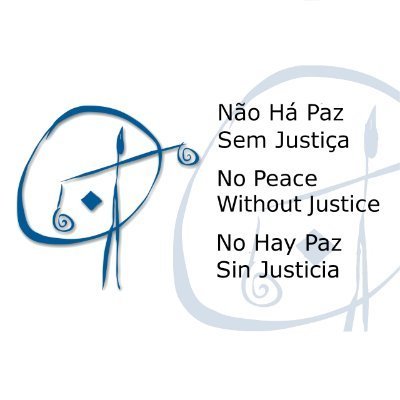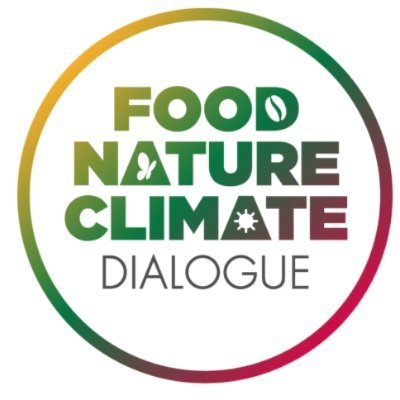Global mobilisation for the recognition of ecocide
Sunday March 20th - Friday March 25th 2022
At this first-ever global mobilisation calling for the recognition of ecocide, citizens, campaigners and elected representatives collaborated across sectors of society, and united behind with one message: Stop Ecocide Everywhere.
A central aspect of the mobilisation was to call on the European Union to recognize ecocide in European law, as part of the Environmental Crime Directive - a legislative proposal for a new EU directive on the protection of the environment through criminal law.
But this week of mobilisation was also an opportunity for people around the globe to speak out on the need to criminalise ecocide at the international level, which is currently a missing element in the global legal framework to deal with the climate crisis and ecological collapse.
WHAT HAPPENED? (In brief: )
A strategic coordinated action in 6 European countries
18 in-person events and 6 webinars
Mobilisation graphics translated in 14 languages
Tree planting in Democratic Republic of Congo and Portugal
Coverage by the Belgian and Italian press, Spanish radio, and Dutch TV - as part of the Fridays for Future strike.
POLITICAL MOVES
In Denmark, two parties, Volt and the Frie Grønne (Independent Greens) stated their support for the criminalisation of ecocide. MP Susanne Zimmer for Frie Grønne (Independent Greens) will be convening the Foreign Minister Jeppe Kofod, for a question debate in the Folketing (Danish Parliament) on April 20th, requesting to make clear what the government's position is and if it intends to follow the international movement to add ecocide to the Rome Statute.
In Scotland, Monica Lennon put forward a motion in the Scottish Parliament, to support and acknowledge the International Week of Action #StopEcocideEverywhere and “welcomes action in Scotland to explore ecocide legislation and to contribute to what it sees as the global movement for ecocide law”.
Parliamentarians from Canada (Elizabeth May, pictured here), Italy (Rosa d’Amato) and Cyprus (Alexandra Attalides) also publicly stated their support for the mobilisation on social media.
In Iceland, a resolution was submitted to Alþingi (Icelandic Parliament) calling for support for an international crime of ecocide as well as national ecocide legislation. It received cross party support from the Pirate Party, the Liberal reformation, the Social Democrats and the Left Greens.
“The fight for ecocide to be recognized as a violation of international law is the key to protecting us and future generations.” — Andrés Ingi Jónsson, Member of Parliament for the Pirate Party who submitted the resolution.
WHAT HAPPENED IN THE EUROPEAN UNION?
In Brussels, several actions were organised throughout the week by End Ecocide Belgium and Rise for Climate Belgium, with the participation of members of the European Parliament, notable personalities activists and collectives from civil society.
In Amsterdam, Stop Ecocide Netherlands hosted a successful panel discussion with various guest speakers.
In Reykjavik, a seminar was held at the Kjarvalsstaðir Museum, featuring a parliamentarian, a natural scientist, an international jurist and a leader of an environmental NGO.
In Madrid and Barcelona, activists gathered in front of the Representation of the EU Commission, while in Segovia people took their Stop Ecocide banners out on the streets.
In Rome, Stop Ecocidio Italia joined the celebration of the 65th anniversary of the Treaty of Rome organized by Volt Italia, and were featured among the official speeches.
In Bologna, students organised a stall in front of the university.
Scottish activists in Stirling did a creative action to honour murdered and missing environmental defenders.
In Bremen, Germany, an info stall was also set up on the town market square, where Stop Ecocide Deutschland shared flyers and engaged with the passer by.
In Paris, a conference took place with NGO leaders and legal experts, while in Strasbourg, a small group of determined youth from Youth for Climate Alsace, organised a symbolic action in front of the European Court of Human Rights.
In Copenhagen, Stop Ecocide Denmark met with a Member of Parliament, Susanne Zimmer from the Frie Grønne (Independent Greens), and received their support to advance the criminalisation of ecocide.
WHAT HAPPENED BEYOND EUROPEAN BORDERS?
In Lima, Perú Sin Ecocidio gathered Indigenous leaders, activists and civil society in front of the Palace of Justice. In song, prayers and speeches, the rally raised awareness of communities.
“Los pueblos se unen para decir paremos la destrucción de nuestra madre Tierra.”“Ama Wañuy Pacha” (Stop Ecocidio in Quechua)
In Turkey, several events happened throughout the week where the topic of ecocide was raised by the Climate Justice Coalition Türkiye.
“We are an umbrella platform where NGOs, Unions, and Chambers put their powers and expertise together. Our call is ready to revise the scope of environmental law and incorporate ecocide into Turkish law.” — İlksen Dinçer Baş, activist for the Climate Justice Coalition Türkiye, Ecocide Working Group.
In the Democratic Republic of Congo, citizens and pupils planted trees as part of a local regeneration project, and contributed to the photo action #StopEcocideEverywhere.
PRESENCE AT THE YOUTH STRIKES - FRIDAYS FOR FUTURE
For the final day of the mobilisation, we wanted to express our solidarity with youth strikers around the world and amplify their call to action: People Not Profit.
The presence of Stop Ecocide teams was visible in the streets of Berlin and Amsterdam - while Tunisian and Swedish activists also carried the message to Stop Ecocide Everywhere at their local strikes.
STRATEGIC ACTION
In partnership with the office of Marie Toussaint (MEP)
On Thursday 24th, letters were sent to to the Ministers of Justice and Ministers of the Environment in Finland, Italy, Germany, Denmark, Spain and Belgium, asking them to seize the opportunity to recognize and condemn the most serious crime against the environment as part of the environmental crime directive.
As a citizen, you can call on the EU to recognize ecocide by signing this petition.
LAUNCH OF
ARTISTS FOR ECOCIDE LAW
On Sunday March 20th, the international day for the recognition of ecocide, the network Artists for Ecocide Law was launched: a global community of performers, musicians and visual artists supporting the movement to make ecocide an international crime.
DIGITAL CAMPAIGNING
Each day of the week of mobilisation, we connected the theme of ecocide with international days, like UN Day of Forests and World Water Day, and other key topics of the wider climate justice movement, such as environmental defenders and extractive industries. This was a way to express solidarity, create alliances and support movement-building.
The mobilisation generated hundreds of tweets, instagram posts in 10+ languages using #StopEcocideEverywhere.
SUPPORTED AND AMPLIFIED BY
We are thankful for the following organisations, partners or allies, who have amplified this week of mobilisation calling for the recognition of ecocide:

































